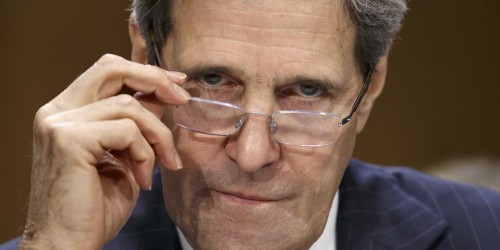On the eve of the 6th round of talks between Iran and the 5+1 Powers over a comprehensive nuclear agreement — the last before the expiry of an interim deal on July 20 — US Secretary of State John Kerry has issued a public warning to Tehran.
Writing in The Washington Post, Kerry said:
Iran must choose. During the comprehensive negotiations, the world has sought nothing more than for Iran to back up its words with concrete and verifiable actions. We have, over the past several months, proposed a series of reasonable, verifiable and easily achievable measures that would ensure Iran cannot obtain a nuclear weapon and that its program is limited to peaceful purposes. In return, Iran would be granted phased relief from nuclear-related sanctions.
That might be treated as standard rhetoric before the private negotiations, but Kerry’s next sentences of finger-wagging indicate that his challenge is more than tactical:
What will Iran choose? Despite many months of discussion, we don’t know yet. We do know that substantial gaps still exist between what Iran’s negotiators say they are willing to do and what they must do to achieve a comprehensive agreement. We also know that their public optimism about the potential outcome of these negotiations has not been matched, to date, by the positions they have articulated behind closed doors.
Then the US Secretary of State puts out the real scare words. In the run-up to the July 20 deadline, diplomats on both sides have held out the safety net of an extension of the interim agreement while negotiations continue.
Kerry threatens to pull the net away:
Our negotiators will be working constantly in Vienna between now and July 20. There may be pressure to put more time on the clock. But no extension is possible unless all sides agree, and the United States and our partners will not consent to an extension merely to drag out negotiations. Iran must show a genuine willingness to respond to the international community’s legitimate concerns in the time that remains.
Here’s the curiosity in the column. Kerry says, “Throughout these talks, Iran’s negotiators have been serious,” and he points to concrete steps by Tehran since November:
Iran has also defied the expectations of some by meeting its obligations under the Joint Plan of Action, which has allowed time and space for the comprehensive negotiations to proceed. Specifically, Iran has been eliminating its stockpile of higher levels of enriched uranium, limited its enrichment capability by not installing or starting up additional centrifuges, refrained from making further advances at its enrichment facilities and heavy-water reactor, and allowed new and more frequent inspections.
So why then is the Secretary of State issuing a public ultimatum to Iran to make concessions or prepare for a break-off of talks? Is there a specific impasse that cannot be resolved through compromise or is he posturing towards sceptics in Congress and beyond, covering the private deliberations that could still produce an agreement?
Kerry offers no clue regarding the substance of the talks. There is not a single detail: about the number and level of Iran’s centrifuges for uranium enrichment, probably the main sticking point; the status of Tehran’s nuclear facilities; the “possible military dimensions” that have previously been used by the West as a diplomatic stick against Iran.
No, there is only the ominous Agree-or-Else:
If Iran is able to make these choices, there will be positive outcomes for the Iranian people and for their economy. Iran will be able to use its significant scientific know-how for international civil nuclear cooperation. Businesses could return to Iran, bringing much needed investment, jobs and many additional goods and services. Iran could have greater access to the international financial system. The result would be an Iranian economy that begins to grow at a significant and sustainable pace, boosting the standard of living among the Iranian population. If Iran is not ready to do so, international sanctions will tighten and Iran’s isolation will deepen.
The talks open in Vienna on Wednesday.

